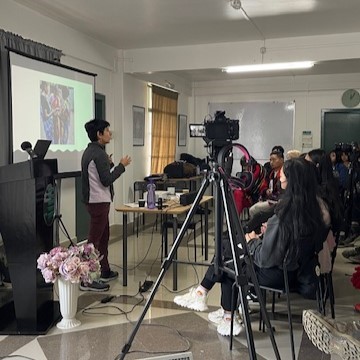Highland Gathering 2023: Difference between revisions
No edit summary |
No edit summary |
||
| (2 intermediate revisions by the same user not shown) | |||
| Line 28: | Line 28: | ||
'''"Risks to Indigenous Heritage Related to Watercourses in the Amazon: Kalapalo Management of Rivers, Lakes, and Riverine Life in a Changing Environment."''' | '''"Risks to Indigenous Heritage Related to Watercourses in the Amazon: Kalapalo Management of Rivers, Lakes, and Riverine Life in a Changing Environment."''' | ||
Delivered by | Delivered by Dr. Antonio Guerreiro, the lecture explored the interplay between traditional practices and environmental stewardship in the face of climate change. His article in the Highlander Journal ([https://journals.highlandinstitute.org/index.php/thehighlander/article/view/40 available open access here]) is an edited version of this lecture. | ||
---- | ---- | ||
| Line 53: | Line 53: | ||
* '''Dr. Antonio Guerreiro''' (State University of Campinas, Brazil): Specialist in Amazonian indigenous knowledge. | * '''Dr. Antonio Guerreiro''' (State University of Campinas, Brazil): Specialist in Amazonian indigenous knowledge. | ||
* '''Ms. Catriona Child''' (The Highland Institute, India): Leader in cultural heritage preservation. | * '''Ms. Catriona Child''' (The Highland Institute, India): Leader in cultural heritage preservation. | ||
* '''Ms. Anna Ziya Geerling''' (UiT, The Arctic University of Norway): Workshop | * '''Ms. Anna Ziya Geerling''' (UiT, The Arctic University of Norway): Workshop leader in creative performing arts | ||
* '''Dr. Michael Heneise''' (UiT, Norway/The Highland Institute): Expert in social anthropology. | * '''Dr. Michael Heneise''' (UiT, Norway/The Highland Institute): Expert in social anthropology. | ||
* '''Ms. Meziwang Zeliang''' (Nagaland Climate Change Cell): Local climate resilience advocate. | * '''Ms. Meziwang Zeliang''' (Nagaland Climate Change Cell): Local climate resilience advocate. | ||
Latest revision as of 09:04, 24 November 2024
The Highland Gathering 2023 merged with the 11th annual Highlander Lectures and was organized by The Highland Institute in partnership with Ekologos—a collaborative project aimed at advancing higher education for sustainable futures. Held in Kohima, Nagaland, from 14–19 December 2023, this gathering brought together scholars, community leaders, and artists to explore innovative research methodologies and foster collaborations addressing challenges in the Anthropocene.
Theme: Deep Collaboration in the Anthropocene
The 2023 Highland Gathering focused on "Deep Collaboration in the Anthropocene," emphasizing intersubjective, interrelational, and interdependent methodologies. The event aimed to strengthen institutional and community partnerships, address climate change impacts, and promote sustainable educational policies.
Programme Highlights
The gathering offered an immersive blend of workshops, lectures, and field excursions, designed to cater to junior and senior scholars, community leaders, and practitioners.
Discussions and Workshops
- Ethnographies of Gender, Labour, and Equality in India’s Borderlands
- Urban and Rural Ethnographies: Including topics such as "What is Work in Fieldwork?" and "Life and Family Histories."
- Documentary and Film-Making Techniques: Hands-on workshops on non-fiction storytelling and ethnographic film production.
- Intersubjective Ecologies Labs: Focused on decolonizing human-nature relationships, speculative futures, and interspecies learning.
- Ekologos Wiki Training: Sessions on curating indigenous knowledge in digital archives.
- Climate Change in Nagaland: Exploring local impacts and adaptations.
- Cumulative Impacts in High North Ecosystems: Addressing stressors in Arctic environments.
- Tasting Tomorrow: Showcasing climate-adapted cultural heritage cuisine.
Highlander Lecture 2023
The annual Highlander Lecture featured the keynote:
"Risks to Indigenous Heritage Related to Watercourses in the Amazon: Kalapalo Management of Rivers, Lakes, and Riverine Life in a Changing Environment."
Delivered by Dr. Antonio Guerreiro, the lecture explored the interplay between traditional practices and environmental stewardship in the face of climate change. His article in the Highlander Journal (available open access here) is an edited version of this lecture.
Field Excursions
Participants engaged in field trips to nearby villages, exploring traditional practices and community-led conservation efforts.
- Khonoma Village:
- India’s first "green village" and a pioneer in community conservation through the Khonoma Nature Conservation and Tragopan Sanctuary (KNCTS).
- Insights into sustainable slash-and-burn agriculture and eco-tourism.
- Mezoma Village:
- Known for its monoliths, traditional hilltop fort, and "lovers' path" leading to terraced paddy fields.
- A blend of spiritual heritage and agricultural ingenuity.
- Kigwema and Mima Villages:
- Kigwema: Historical site tied to WWII's Battle of Kohima.
- Mima: Renowned for traditional beekeeping and honey production, offering insights into sustainable livelihoods.
Leadership and Facilitators
The gathering featured esteemed scholars and practitioners leading discussions and workshops, including:
- Dr. Meera Baindur (RV University, India): Expert in environmental humanities.
- Prof. Thomas Bøhn (Institute of Marine Research, Norway): Researcher in marine ecosystems and bioeconomy.
- Dr. Antonio Guerreiro (State University of Campinas, Brazil): Specialist in Amazonian indigenous knowledge.
- Ms. Catriona Child (The Highland Institute, India): Leader in cultural heritage preservation.
- Ms. Anna Ziya Geerling (UiT, The Arctic University of Norway): Workshop leader in creative performing arts
- Dr. Michael Heneise (UiT, Norway/The Highland Institute): Expert in social anthropology.
- Ms. Meziwang Zeliang (Nagaland Climate Change Cell): Local climate resilience advocate.
Key Themes and Outcomes
Ethics in Research
The event emphasized ethical research practices, leading to the drafting of a Research Ethics Manifesto. This document aims to guide participatory and community-led approaches in fieldwork.
Education and Capacity Building
Junior scholars and early-career researchers participated in a winter school, gaining skills in ethnographic methodologies, documentary filmmaking, and collaborative research techniques.
Interdisciplinary Collaboration
Dialogue circles addressed themes such as hunting and conservation, livelihood knowledge systems, and storytelling as a research tool.
Ekologos Wiki Training
The gathering featured four sessions on Ekologos Wiki, training participants to curate Traditional Ecological Knowledge (TEK) ethically and collaboratively. Participants explored:
- Community-led curation practices.
- Digital documentation and archiving.
- Privacy protocols ensuring indigenous knowledge remains under community control.
Legacy of the Highland Gathering
The Highland Gathering continues to evolve as a premier platform for interdisciplinary collaboration and community engagement. By blending traditional knowledge with cutting-edge research, the 2023 event reinforced its commitment to sustainable futures and transformative educational practices.
For further details, visit Highland Institute or Ekologos Wiki.
